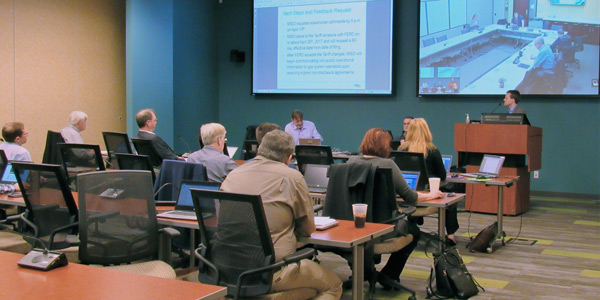By Amanda Durish Cook
CARMEL, Ind. — MISO is preparing nondisclosure agreements and associated Tariff language to share gas usage estimates with pipeline operators, but some stakeholders are voicing reservations about the pilot program.
The RTO says the nondisclosure agreements will be required before staff of pipelines or local distribution companies can view hourly burn estimates based on the day-ahead market clearing. “MISO will not share any information before that signed nondisclosure agreement,” Mark Thomas, MISO manager of gas-electric coordination, told the April 6 Reliability Subcommittee meeting.
MISO has lined up three gas system operators for “limited sharing” of day-ahead gas usage profiles in 2017 under the pilot program, an effort to ensure gas-fired generators have fuel when they need it.
The RTO said it will outline the use of the nondisclosure agreements in section 38.9.1(A) of its Tariff and file the changes with FERC by April 26. Thomas asked for stakeholder comment on the language insertion by April 13.
MISO said it would wait for FERC acceptance before sharing profiles. Thomas said the RTO has not yet determined at what frequency the information would be provided.
Multiple stakeholders voiced apprehension that reliability will be harmed if operators act on partial, estimated data provided by MISO. Subcommittee Chair Tony Jankowski questioned why the RTO would move ahead on the program with what he said was incomplete data based solely on day-ahead market activity.
Phil Van Schaack, MISO gas-electric operations coordinator, reminded stakeholders that the program is a pilot and insisted the sharing of generator start and stop times and estimated burn rates will be helpful. “This is a way to start the exchange of some data,” Van Schaack said. “The pipeline operators are excited by this.”
Thomas said if the pilot program does result in the sharing of “bad information,” MISO will scrap the program.
Indianapolis Power and Light’s Lin Franks said that while she is usually “all for” the sharing of information, the pilot program could cause problems. If MISO’s information clashes with generator operators’ information, they might be in the position of defending their efficiency, she said.
“You’re feeding the public frenzy of challenging other people’s data, if this becomes public,” she said. “This does absolutely nothing for resource adequacy.”
MISO said the pilot was authorized by FERC Order 787, which allows RTOs to share nonpublic information with gas operators. Previously, staff has said that the RTO is not attempting to influence generator behavior with the use of hourly profiles. (See MISO to Continue Gas-Electric Coordination Efforts in 2017.)
“MISO believes that sharing nonpublic, operational information with gas system operators can increase reliability for both industries,” the RTO said in a presentation. “Gas usage profiles, notably in severe operating conditions, will increase fuel assurance and reliability for gas-fired generators and will facilitate lines of communication with gas system operators.”






